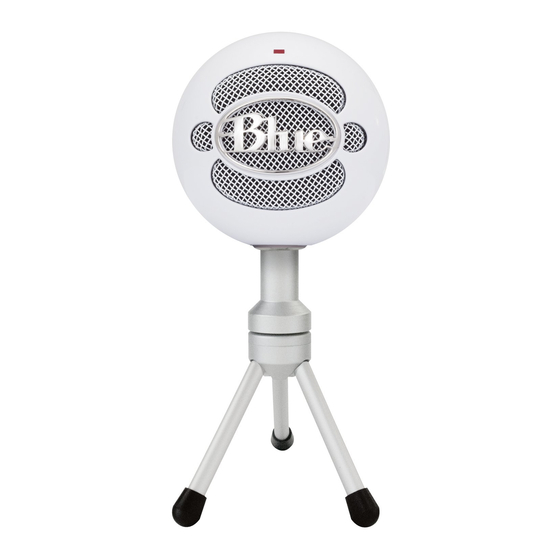Blue Snowball iCE Краткое руководство по эксплуатации - Страница 2
Просмотреть онлайн или скачать pdf Краткое руководство по эксплуатации для Микрофон Blue Snowball iCE. Blue Snowball iCE 4 страницы. Plug and play usb microphone
Также для Blue Snowball iCE: Руководство пользователя (8 страниц)

GETTING STARTED WITH
SNOWBALL iCE
After unpacking your Snowball iCE, mount the microphone on
the Blue Snowball iCE desktop tripod stand, or on a standard
boom arm or mic stand. Connect the Snowball iCE to your
computer with the supplied USB cable—the LED just above
the Blue logo will glow red, indicating power has reached the
Snowball iCE. Now you can start recording and streaming in
stunning audio quality.
SOFTWARE SETUP
Whatever your favorite software is—Audacity, Garageband, iMovie,
Skype, GotoMeeting, you name it—Snowball iCE will produce
amazing results. Simply plug the mic into your Mac or PC and
start down the path of your next project—no drivers required. It's
that easy.
For game streamers, Snowball iCE is compatible with most
popular live streaming software programs including Discord, Open
Broadcaster Software (OBS), XSplit, Gameshow and more.
2
USING SNOWBALL iCE WITH PC
(WINDOWS 7, 8.1, OR 10)
1. Connect to your PC using the provided USB cable.
2. From the Start menu, select the Control Panel.
3. From the Control Panel, select the Sound icon.
4. On the Recording tab, right-click on Blue
Snowball iCE and select Properties.
5. Select the Level tab, and select appropriate
volume level (start at midway point of
the slider & adjust from there)
USING SNOWBALL iCE WITH MAC
(macOS 10.10 OR HIGHER)
1. Connect to your Mac using the provided USB cable.
2. Open System Preferences and select the Sound icon
3. Click the Input tab and select Blue Snowball iCE.
4. Set input volume to the appropriate level. The mic is
sensitive and may require a very low volume setting
FREQUENCY RESPONSE POLAR PATTERN
+10
These charts are a starting point for the sound provided. How the microphone
+5
reacts in a particular application will differ depending on sound source,
dB
orientation and distance from sound source, room acoustics and other factors.
-5
For more tips on miking and recording techniques, check out
-10
20
40 50
100
500
1kHz
+10
+5
dB
-5
-10
20
40 50
100
˚
˚
5
315
45
10
15
20
25
˚
270
dB
90
bluedesigns.com.
˚
˚
225
135
˚
5kHz
10kHz
20kHz
180
500
1kHz
5kHz
10kHz
100Hz
250Hz
500Hz
1kHz
˚
2.5kHz
4kHz
8kHz
16kHz
˚
270
20kHz
3
